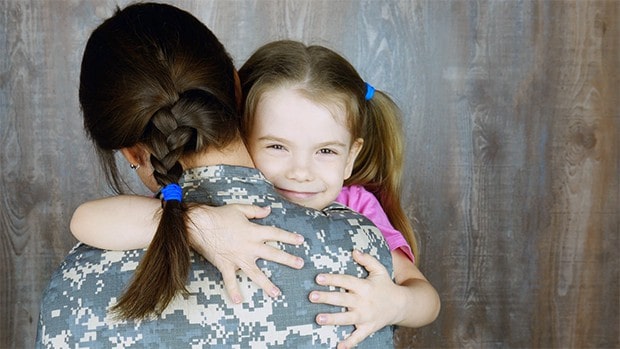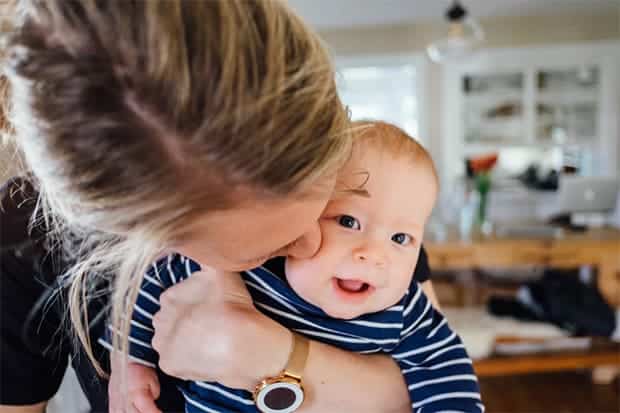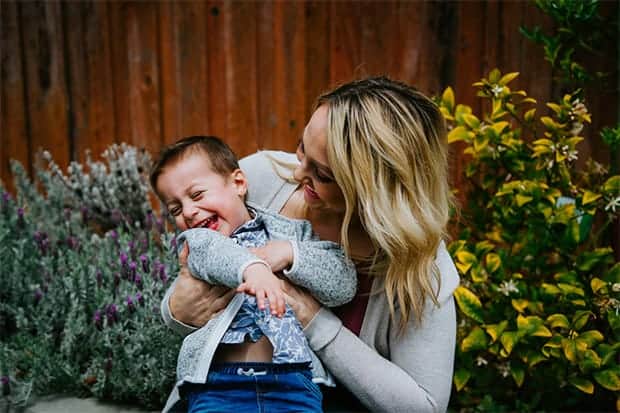Physical affection such as hugging a child is undeniably one of the most effective methods of nurturing a child’s growth and development. Its many beneficial effects to humans, especially on kids, can never be underestimated. The power of loving touch does not only make kids feel loved and secured; it also helps develop their emotions and behaviors as they grow up.

This study suggests that the best age to hug your child is as early as four months old. According to the same study, the heart rate of a 4-month old infant relaxes when his mother, father, or primary caregiver gives him a loving hug.
The high levels of intimacy that can be generated from hugging enhance the parent-child bond, a key factor in a child’s development. Hugging stimulates the production of oxytocin, the happy hormone in the brain that helps reduce stress and anxiety. Hugging your child can also help end a temper tantrum, manage interpersonal conflicts, and treat bad behaviors.
There’s nothing sweeter in this world than receiving warm, intimate hugs from your beloved child.
5 Amazing Benefits of Hugging Kids
Raising your child with a lot of cuddling is specifically essential to his physical, mental, and emotional growth. A warm, loving hug is also beneficial to a child’s overall health and well-being.
Below are some of the many helpful benefits of hugging kids:
Hugging Helps Stop Temper Tantrums in Children
Contrary to a popular belief, hugging a child who is having a temper tantrum does not reinforce negative behaviors. This act is certainly not synonymous with giving in or surrendering to your child’s appalling or savage behaviors.
Hugging your child during an intense emotional outburst is, in fact, an efficient way of teaching him how to regulate his emotions. This is the best calming method that can help your child cope with anger and anxiety.
It is important to note that a temper tantrum is a child’s way of releasing emotions as some adults do. The only difference (that perhaps adults need to consider) is that children do not yet develop a concrete method of regulating their emotions.
Providing them supportive emotional mechanisms such as hugging during these vulnerable times is extremely important to prevent emotional collapse or breakdown. Your warmest hugs can boost their emotional security to help them calm down during stressful situations. This is an important milestone in your child’s growth and development.

Hugging Develops Smarter Kids
Constant sensory stimulation is needed for a child’s brain to grow and develop properly. Among the five senses, touch is the very first to develop in infants. But note that only a nurturing touch can provide the positive stimulation a young brain needs for optimal growth and development. Warm, intimate hugs are a form of positive stimulant that can be beneficial for a child’s physical, emotional, and cognitive development.
A recent study conducted in the Nationwide Children’s Hospital in Ohio found that hugging your child often can increase the size of his brain. Collett Smart, a young psychologist, believed that when mothers nurture their children through warm, intimate hugs, there is a significant growth in the size of the hippocampus. This is the area of the brain that is involved in various brain functions such as learning, memory formation, and regulating emotions.
Hugging Keeps Children Healthy and Strong
As stated above, hugging your child is beneficial to his overall health and well-being. Neuroscience encourages people, especially parents, to appreciate and value the power of intimate touch. Cuddling, snuggling, hugging, and other forms of loving touch can trigger the release of oxytocin, the happy hormone in the brain. This special neuropeptide makes people feel good, safe and loved.
Many psychologists believe that oxytocin can help kids grow up to be kind, affectionate, and compassionate. Neuroscience also explains that the release of oxytocin stimulates the growth hormones in the body.
A mother’s loving hug can provide many beneficial effects to the baby such as stabilizing heart rate, lowering blood pressure, maintaining normal body temperature, and strengthening his immune system. There are also claims that hugging kids often may help reduce pain and inflammation. Hugs can also bring many beneficial effects to a child’s mental health and emotional stability.
One power hug can trigger the release of feel-good hormones in the brain – oxytocin, serotonin, and dopamine. These hormones can help boost a child’s self-esteem and maintain an excellent state of mind. Showering your child with hugs and loving touch daily can ensure excellent health and mental sharpness at all times.
Hugging Helps Reduce Stress
Cuddling with someone you care about dearly stimulates the production of oxytocin in the body that gives a calming effect and helps you deal better with stress and anxiety. During stressful situations, intimate touch is somehow all you need to distract yourself and keep going in life. Like adults, kids need a loving touch to deal with stressful events.
When they are in distress, their brain releases high levels of cortisol or the stress hormone that will eventually circulate throughout their body. When left untreated for a long time, this can negatively affect their overall health and well-being. Compromised immunity, poor memory, impaired verbal reasoning abilities, and depression are some of these ill effects of toxic cortisol levels in the body.
When you hug your child, the part of your brain that is associated with stress may show reduced activity as stated in this study. Hugging your child often can teach him self-regulation skills or self-control. The emotional security provided by a loving hug will also teach him resilience, a trait that can teach him how to manage interpersonal conflicts. The best part is, both of you can benefit from an intimate hug that can strengthen your emotional bond.

Hugging Reduces Fears and Anxiety in Children
Physical affection is an efficient way of managing fear and anxiety – especially in children. It makes them feel safe, content and connected. When your child feels upset, angry, or anxious, give him a warm, loving hug.
Parental affection provides a powerful healing touch that can alleviate all the negativities and tensions in your child’s body. The increased levels of oxytocin, the cuddle hormone, can help manage your child’s emotions such as reducing fear and anxiety. Hugging can provide intimate physical touch and emotional support that nothing in the world can offer.
Kangaroo care, also referred to as skin-to-skin contact is a form of developmental care that enhances the emotional bond between the baby and the mother immediately after delivery. The warm, intimate hug they share can provide physiological and psychological benefits to the infant.
Kangaroo care can give emotional security to the child that he needs to deal with stress, fear, and anxiety as he grows. Human touch is one of the biggest factors in the general development of your child. Giving him a 20-second hug, also called a warm hug, several times daily is enough for him to face the world with courage and motivation.
Frequently Asked Questions
Here are the top three frequently asked questions about hugging kids and the most accurate answers.
Why Does My Child Want to Hug Me All the Time?
There are numerous possible reasons why your child keeps hugging you, but here are the most popular ones:
Reassurance
Your child is learning to explore the world on his own. Whenever he feels unsure or afraid, he will run back to you for warmth, refuge, and security. You are his ‘home’ and he would always go back to you for reassurance. When your child does this, assure him that he will always have a home whenever he needs one.
Comfort
Grief is a part of life that kids also get to experience. Whenever your child feels sad and scared, he demands any form of physical affection such as a hug. He wants to make sure his needs are met – physical, mental, or emotional. Consider that his intentions are pure and hug him even tighter.
Healing
Hugs are a natural cure for various physiological and psychological illnesses. Children often believe touch can help relieve all their sickness, anxieties, and stresses. But this is somewhat real and effective.
Sharing positive energies can improve everyone’s health and general well-being. When a child is asking for a hug to heal himself, wholeheartedly give it. However, let him realize the value of independence and resolving things on his own.
Joy
Sometimes, your child hugs you because he is overflowing with joy and happiness. Your presence is enough to light up his life and cast all his sorrows. When your kid hugs you out of happiness, reciprocate that hug with a glad-to-see-you embrace.

Love
There is nothing sweeter than a hug made out of pure love. This is the sincerest form of loving touch a person can give you. When your child embraces you because he believes he loves you with all his heart, kiss him and tell him “I Love you”.
How Can I Ensure My Child Is Getting Enough Hugs for a Day?
American author, family therapist, and psychotherapist Virginia Satir once said, “People need four (4) hugs a day for survival, eight (8) hugs for maintenance, and twelve (12) hugs for growth”.
Parents can enjoy hugging their children many times per day for their kids’ physiological and psychological development. Remember, you need not worry about hugging your child excessively.
Who Can and Should Hug My Child?
Friends, family, and loved ones can hug your child. But remember that showing affection should never be forced or implied. Sometimes, the problem is children give or receive physical affection because they feel obligated to comply. Showing affection should come from within and it should be voluntarily given.
Remind your child that he is in charge of his own body and you are only there to support and guide him. If the child thinks hugging becomes sexual and/or is violating his privacy, listen to his sentiments and assess the situation as an adult.
Unlike adults, kids cannot fully verbalize their feelings since they are still at the early stages of language development. They communicate their feelings through apparent nonverbal cues such as facial expressions, body movements, sensory plays, and physical touch.
Hugging is one of the most efficient forms of physical affection that you can give your child. It has many beneficial effects for both the child and parent. However, remind yourself that independence and body autonomy is as important as giving your child a loving touch. When your child feels uncomfortable giving or receiving hugs, understand the situation and value his emotion.
Best of luck, parents!










